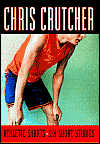
Okay, so I'm a day behind with my second Banned Book Week review. I reached my goal of buying and reading two books from the ALA's 100 Most Frequently Challenged Books 1990-2000 list, but I ran out of time yesterday to review the second. So, here goes:
I'm really happy I chose Chris Crutcher's Athletic Shorts as my second "challenged" book for review. It's so far from what I normally read, what with the sports, teen boy protagonists, and short stories (as opposed to my preferred genre, the novel), that I probably wouldn't have read it otherwise. And, I would have been missing out--Athletic Shorts is a top-notch collection of short stories.
The six stories each star a male protagonist of (usually early) high school age with big problems. One boy, overweight, is elected King of the Winter Ball, just so other kids can make fun of him. Another must come to terms with the death of his parents and little brother by understanding and accepting the teen who killed them in an accident. Another, a mentally-challenged narrator, is a racist and is surprised when his stereotypes turn out to be false. Another loses his girlfriend in an accident, but befriends a young man dying of AIDS, risking his social status in the process. In the most powerful story of the collection, "The Pin," a son challenges his father to a wrestling match after years of suffering domination and humiliation at home. In the funniest of the six stories, the hero fears an upcoming wrestling match because the challenger is so fierce. Turns out she's also a girl.
The six stories are told in first-person narration and all six heroes are unique and very real. Crutcher's use of metaphor in the voices of these boys is spot on and very funny. Here's an example from "The Other Pin": The narrator meets a girl and says, "She is tall and dark, with nearly jet black hair, and eyes so green he could mow them." Or, in a more serious story ("Goin' Fishin'"): "The pizza was ruined. It was still hot enough; but it tasted like hatred, and I ate only part of one piece before splattering it against the wall."
Crutcher introduces each story with an explanation about where the story came from and why he felt it important to write. In his introduction to "Telephone Man," narrated by a racist teen, Crutcher quotes a seventeen-year-old friend: "Racism speaks volumes about those who hide behind it, says exactly nothing of those at whom it is directed."
So why is Athletic Shorts a frequently challenged book? Well, as Crutcher himself writes in the introduction to "Telephone Man," some "people believe when I use the word n***** or s*** or b***** [all racial slurs] or any other of a million slurs, I am condoning the use of these words. They think kids should not be exposed in print to what they are exposed to in their lives."
That's one reason. There's also frank talk of drugs, AIDS, and school bullying. But, Crutcher's right--most teens have been exposed to at least talk of all these things "in their lives." So why shouldn't they read about them?






